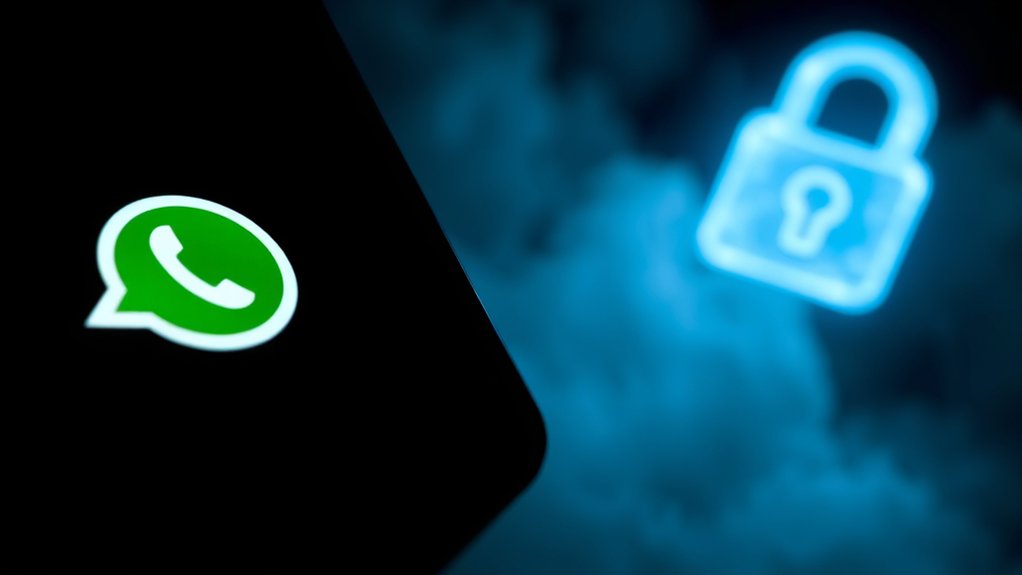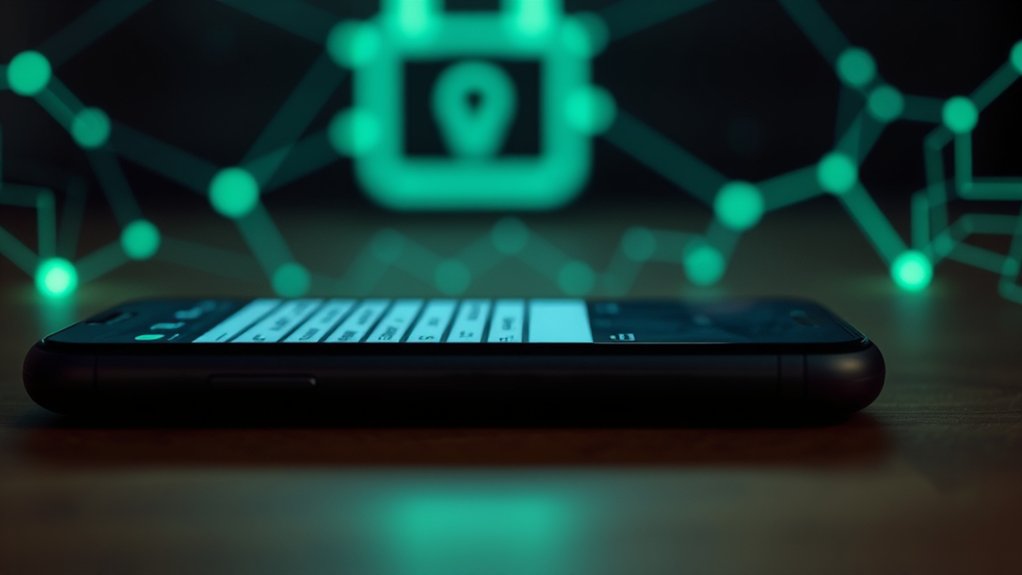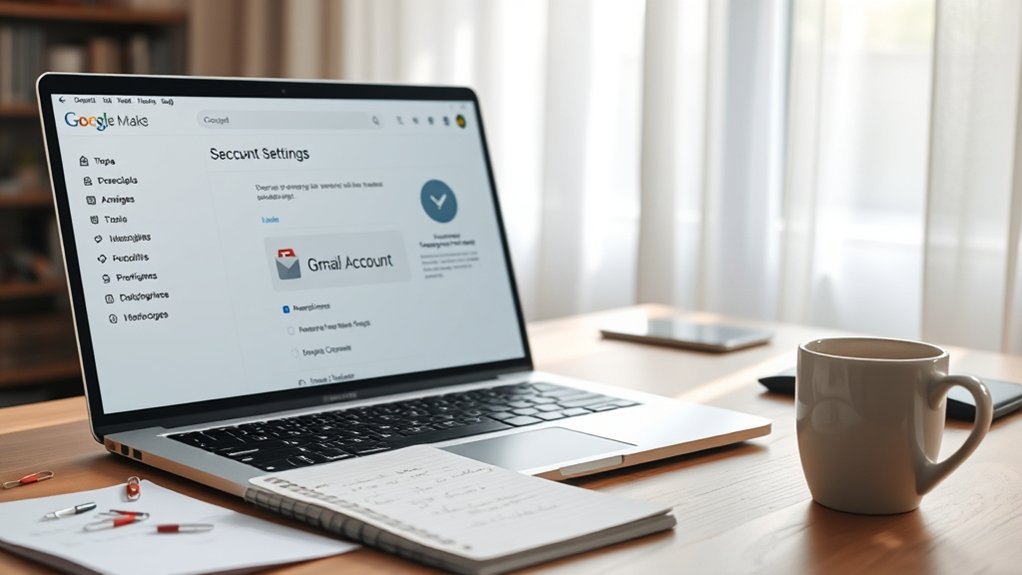WhatsApp employs end-to-end encryption to protect message content; nonetheless, significant privacy concerns persist because of extensive metadata collection shared with its parent company, Meta. This metadata can reveal user communication patterns and behavior. In 2021, mandatory data sharing consent exacerbated transparency issues, particularly for non-EU users not protected by GDPR. Although encryption safeguards messages, it cannot prevent threats from malware or spyware. Understanding these privacy vulnerabilities is vital for users who seek to protect their information. More insights follow.

Is WhatsApp spying a genuine threat to user privacy? The answer lies in understanding the security features and potential pitfalls associated with the app. WhatsApp employs end-to-end encryption, meaning that messages can only be read by the sender and receiver. This strong security measure utilizes Curve25519 for key exchange and AES-256 for encryption.
Nevertheless, this encryption does not protect against device-based threats such as spyware, especially the notorious Pegasus, which can breach device security and expose messages.
Encryption alone cannot safeguard against device-based threats like spyware, exemplified by the notorious Pegasus that compromises security and reveals messages.
Privacy concerns extend beyond the encryption itself. WhatsApp collects extensive metadata, including communication patterns and user data, which it shares with its parent company, Meta. This metadata, albeit not content of the conversations, can reveal a significant amount about a user’s behavior and preferences. Additionally, over 295 crore daily active users utilize the app, suggesting that the sheer volume of users may attract even greater scrutiny from authorities. WhatsApp is seen as a freeware instant messenger that facilitates a range of communication options, but its privacy practices remain concerning.
The app’s 2021 policy change made it mandatory for users to consent to data sharing with Meta, raising eyebrows over transparency and user control. It was highlighted that users in the EU are subject to GDPR regulations, yet WhatsApp’s compliance does not fully shield them from metadata collection issues. Moreover, utilizing a virtual private network (VPN) can help enhance user privacy by encrypting internet connections.
Furthermore, backup data stored on cloud services lacks automatic encryption, leaving them susceptible to unauthorized access. Users may likewise be exposed to scams when joining public groups, which reveal their phone numbers.
The risks are compounded by external threats, such as social engineering tactics and phishing scams designed to deceive users into compromising their accounts.
To improve security, WhatsApp recommends implementing two-factor authentication and encrypted backups. Regular software updates assist in applying the latest security patches.
Nonetheless, although WhatsApp’s encryption fortifies privacy against interception, the significant metadata collection raises vital questions about user privacy. These factors illustrate the ongoing tug-of-war between strong security measures and the persistent vulnerabilities users face.
As users navigate these challenges, maintaining vigilance becomes fundamental in safeguarding personal information in an increasingly digital world.
Frequently Asked Questions
Can I Prevent Whatsapp From Sharing My Data With Third Parties?
Users cannot completely prevent WhatsApp from sharing data with third parties; the app retains certain metadata that can be shared with its parent company, Meta. Although end-to-end encryption protects message content, metadata such as interaction times and users’ IP addresses remains accessible.
Users can mitigate some data sharing by adjusting privacy settings, opting out of certain features, and utilizing tools such as VPNs.
Nevertheless, inherent data-sharing practices remain part of the WhatsApp service framework.
What Security Measures Does Whatsapp Have Against Spying?
WhatsApp implements numerous security measures to protect users against spying. The platform employs end-to-end encryption, ensuring only communicators can read messages.
It furthermore reroutes calls to obscure IP addresses, bolstering privacy. Regular security notifications alert users about changes to security codes.
In addition, features like two-step verification and device verification safeguard accounts from unauthorized access.
Ongoing development and regular security audits demonstrate WhatsApp’s commitment to enhancing user safety against emerging threats and vulnerabilities.
Does Whatsapp Notify Users of Data Breaches?
WhatsApp does not have a systematic approach to notifying users about data breaches. Recent reports revealed a significant leak involving 487 million user phone numbers, with many from the US and Egypt.
In spite of these breaches, WhatsApp often dismisses allegations, citing unverified claims. Users find themselves reliant on external sources like Cybernews to confirm data compromise, emphasizing the platform’s lack of transparency and insufficient data breach notification policies, which leaves users vulnerable to potential threats.
How Can I Report Suspicious Activity on My Whatsapp Account?
To report suspicious activity on WhatsApp, users should open the chat with the concerning contact, select the contact or group name, and choose the “Report” option.
This process sends the last five messages and sender information to WhatsApp, allowing for an evaluation of the situation. Users are too provided with the option to block the sender, ensuring further communication is prevented.
Reporting remains anonymous, keeping the sender unaware of the report.
Are There Alternative Messaging Apps That Provide Better Privacy?
Several alternative messaging applications offer improved privacy features compared to WhatsApp.
For instance, Signal employs a strong end-to-end encryption protocol, acclaimed for its transparency and security controls.
Telegram provides encryption in its secret chats, even though its protocol is not open-source.
Threema avoids requiring a phone number for user identification, while Wire allows for self-hosting options, thereby increasing data control.
Users concerned about privacy should consider these platforms for safer communication.









